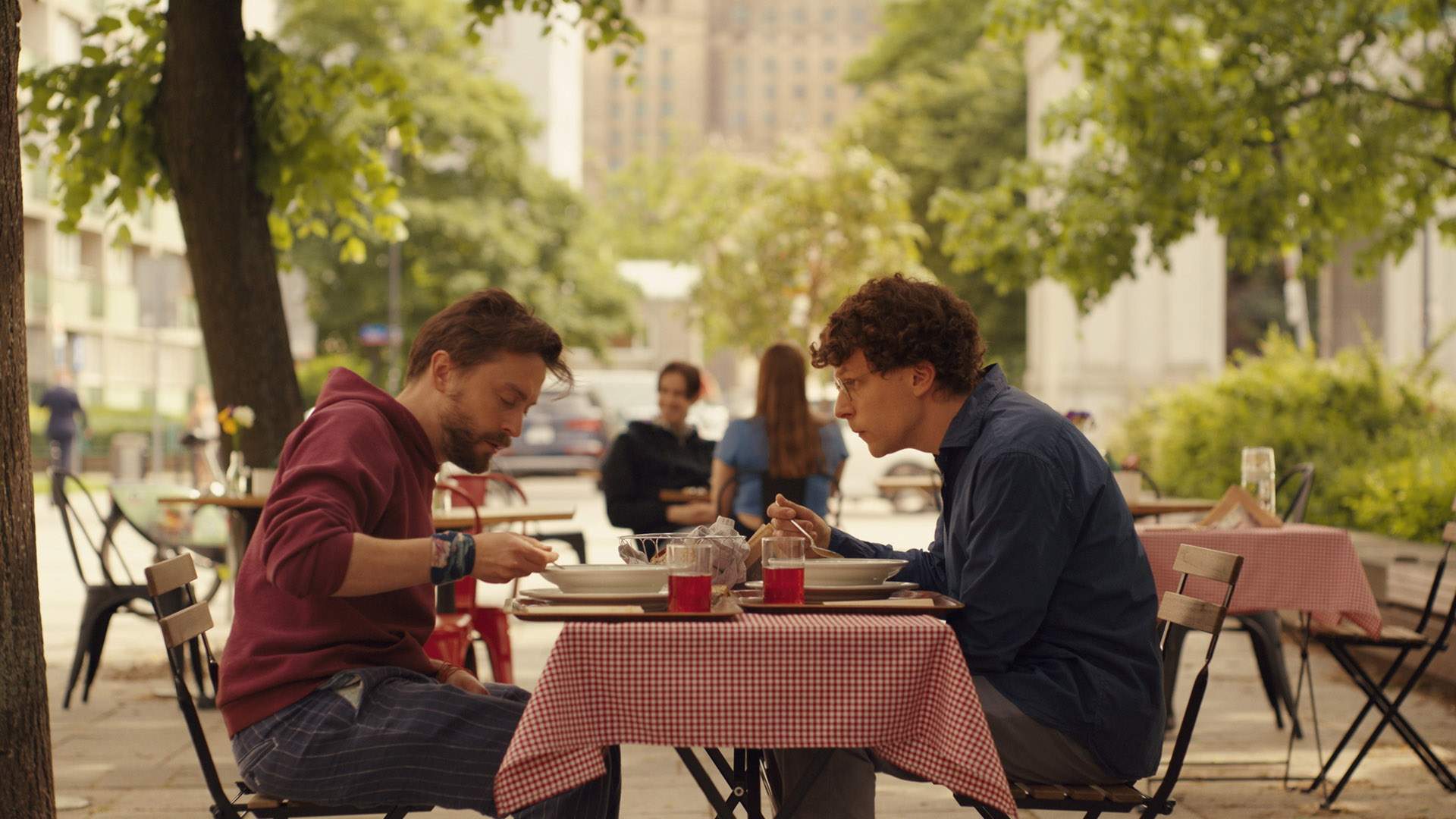When IRL Anxieties, Experiences and Personal History Inspire an Absolute Dramedy Gem: Jesse Eisenberg Talks 'A Real Pain'
For his second feature as a filmmaker after 2022's 'When You Finish Saving the World', the Oscar-nominated actor keeps exploring what pain is valid.
In A Real Pain, as two cousins make a pilgrimage to walk in their dearly departed grandmother's shoes, the concept of alternative possible lives arises. Jesse Eisenberg's second film as a writer/director after 2022's When You Finish Saving the World doesn't hop between timelines science fiction-style; rather, when different pasts or futures come up, it follows a relatable Sliding Doors-esque train of thought about the events and decisions that've shaped David (played by Eisenberg) and Benji Kaplan's (Kieran Culkin, Succession) existences. They're in Poland, where their Grandma Dory grew up, and where they might've too if the Holocaust hadn't occurred. On their guided tour, Benji muses with David about their parallel-universe selves, where they're Polish with beards and everything that they've ever known is completely different.
A Real Pain itself is the product of a comparable journey; it could've been a different movie and, originally, it was meant to be. Eisenberg was endeavouring to bring another project to the screen, adapting a short story that he'd penned for Tablet magazine. It was about two friends, not cousins, and instead of Poland they were travelling to Mongolia together. But the Oscar-nominated The Social Network actor, not to mention star of everything from the Zombieland and Now You See Me movies through to TV's Fleishman Is in Trouble, had himself been to Poland. He'd paid tribute to his own family history, visiting the house that his aunt Doris had lived in. He'd also been inspired by that trip to write 2013's off-Broadway play The Revisionist, about a young American man with an older Polish cousin who had survived the Second World War.
An ad for "Auschwitz tours, with lunch", which Eisenberg randomly spotted online, helped him pull together influences from all of the above — the screenwriting task that he'd actually set himself, his prior play, his personal experiences and history — into A Real Pain. Audiences should be grateful that it did. Awards bodies have been so far, including via four Golden Globe nominations (for Best Film — Musical or Comedy, Best Best Performance by a Male Actor in a Motion Picture — Musical or Comedy for Eisenberg, Best Performance by a Male Actor in a Supporting Role in Any Motion Picture for Culkin, and Best Screenplay — Motion Picture, again for Eisenberg), plus love from the Gotham Awards and Independent Spirit Awards. At Sundance, where A Real Pain premiered, the dramedy took home a screenwriting accolade.
Eisenberg isn't just filtering elements of his family's past into the movie, or recreating a trip that he took with his now-wife two decades back. As he did with the Julianne Moore (May December)- and Finn Wolfhard (Saturday Night)-starring When You Finish Saving the World, he's also tapping into his own IRL anxieties. What he's digging into is right there in A Real Pain's name. As he tells Concrete Playground, "I'm trying to examine and ask the question that I ask myself every day: is my pain valid?".
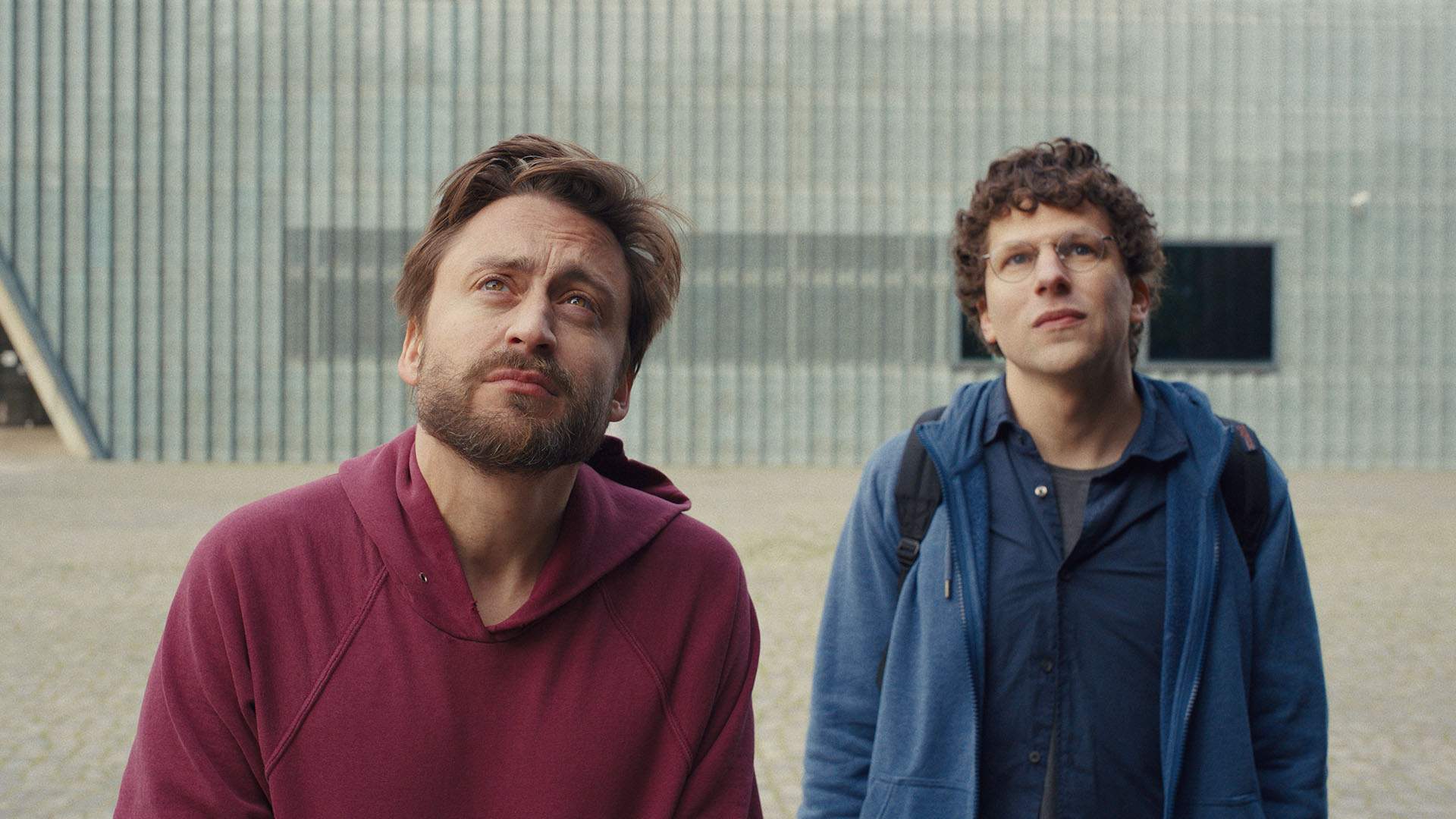
When there's such bigger struggles, troubles and atrocities haunting the world beyond the everyday woes of a person with a largely comfortable life, how can someone feel angst and hurt while also confronted with the bigger picture? In A Real Pain, David and Benji were born mere weeks apart and were almost inseparable as kids, and now make a chalk-and-cheese pair — as is immediately evident while the former leaves a series of messages about meeting up at the airport, where the latter has already been contentedly for hours — but both have their own tussles. In their interactions one on one and with others, one is a ball of tension and apprehension, while the other is laidback and charming. (Based on casting, it's easy to pick which is which before even watching, although Eisenberg initially planned to play Benji.) Where David has also settled into adulthood while grappling with his stresses, however, Benji is in a state of arrested development. Their grandmother's passing hasn't helped.
At a pivotal moment, chatting over dinner with the pair's tour group — which includes Will Sharpe (The White Lotus) as their guide, plus Jennifer Grey (Dollface), Kurt Egyiawan (The Agency), Liza Sadovy (A Small Light) and Daniel Oreskes (Only Murders in the Building) as fellow travellers — while Benji is in the bathroom, David unburdens his feelings in a powerful torrent. "I love him and I hate him and I want to kill him and I want to be him," he notes, getting to the heart of the cousins' complicated relationship. Earlier, they'd been at Lublin's Old Jewish Cemetery. The next day, they'll visit the Majdanek concentration camp. A Real Pain sees its titular emotion in micro and macro, then, and knows how awkwardly that the two clash.
Just as with questioning the legitimacy of routine trials versus all of the worse things in the world, Eisenberg drew that crucial monologue from his own emotions and experiences. "It's also the most-personal part of the movie — and this is a movie that is very personal," he told us. We also chatted with the Rodger Dodger, The Squid and the Whale, Adventureland, The Double, Batman v Superman: Dawn of Justice, Vivarium and Sasquatch Sunset star about how A Real Pain came together, working with Culkin — including Emma Stone's advice as one of the film's producers that he shouldn't play Benji himself — and what he makes of his career 25 years after his screen debut in TV series Get Real.

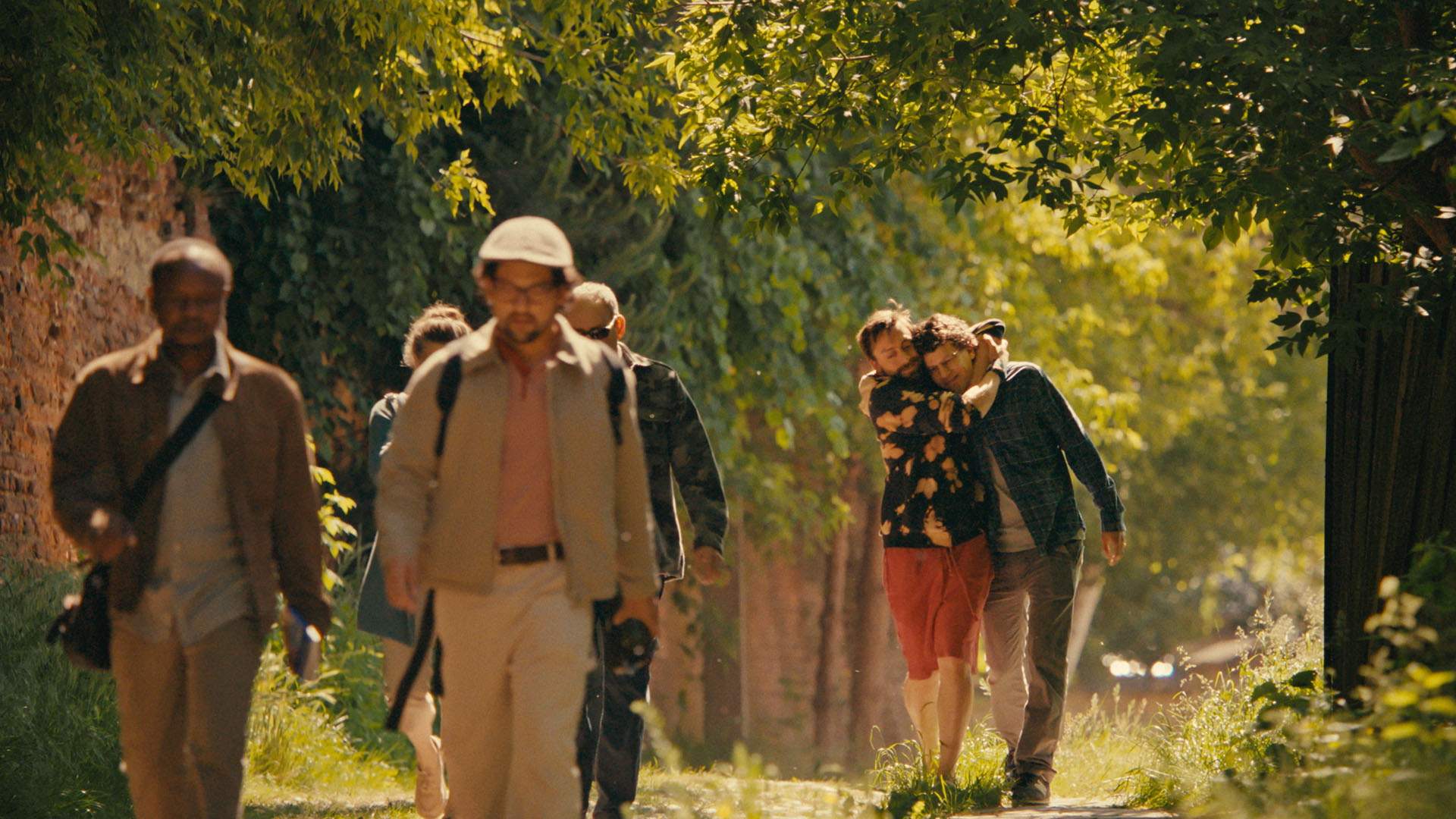
On What Keeps Drawing Eisenberg to the Question of 'What Pain Is Valid?' as a Writer/Director, First in When You Finish Saving the World and Now in A Real Pain
"I've been in the arts since I'm a kid, and I married somebody who works in social justice. And so anytime time I feel I'm doing well or something, I'm reminded that my wife is maybe working with people in more immediate need than I am. And my mother-in-law ran a domestic violence shelter for 35 years, and was unimpressed that her daughter had been married to somebody in movies.
So in that first movie, Julianne Moore plays a woman who runs a domestic violence shelter, and she's kind of unimpressed with her kid, who's her family, not doing anything of social value according to her. And then in A Real Pain, the characters are experiencing this very personal pain. My character has OCD, but medicates it away. And my cousin's character has very dark, dark demons inside of him, but it's on an individual level. And so I thought it would be interesting to put these guys against the backdrop of real historical global objective trauma, like the Holocaust.
Because in both movies I'm trying to examine and ask the question that I ask myself every day: is my pain valid? I live in a comfortable apartment with a nice wife and kid, and work, I have a nice job. But yet I still feel miserable all day. And why do I have those feelings?
So both movies are exploring that exact question. Questions of privilege versus pain — questions about how is it possible that we could feel bad for ourselves when there are so many worse things in the world? In the case of the first movie, it's about domestic violence, and in the case of this movie, it's the Holocaust.
And that's just my preoccupation, which just comes from a very self-centred question of 'why do I deserve to feel self-pity?'.


On A Real Pain Coming Together From First Trying to Write a Different Film, Then Seeing an Online Ad for Auschwitz Tours "with Lunch", and Also a Past Off-Broadway Play, Plus Eisenberg's Own Personal History and Trip to Poland
"It's funny, my friend and I, he's a writer too, we write next to each other at the library every day, and he always says 'once you're on the downslope of the script, you know it's going well'. 'The downslope' in our lingo is basically just once you get past the point of setting everything up and the things are in motion and everything feels right, kind of resolving everything or maybe it's not resolving anything, but that downslope to the end is really smooth.
So the last ten pages of this movie, I wrote, I think, in like five minutes, because my wife was texting me I'm going to be late to pick up my kid, and I was like 'I know, but I know the ending, I just have to..'.
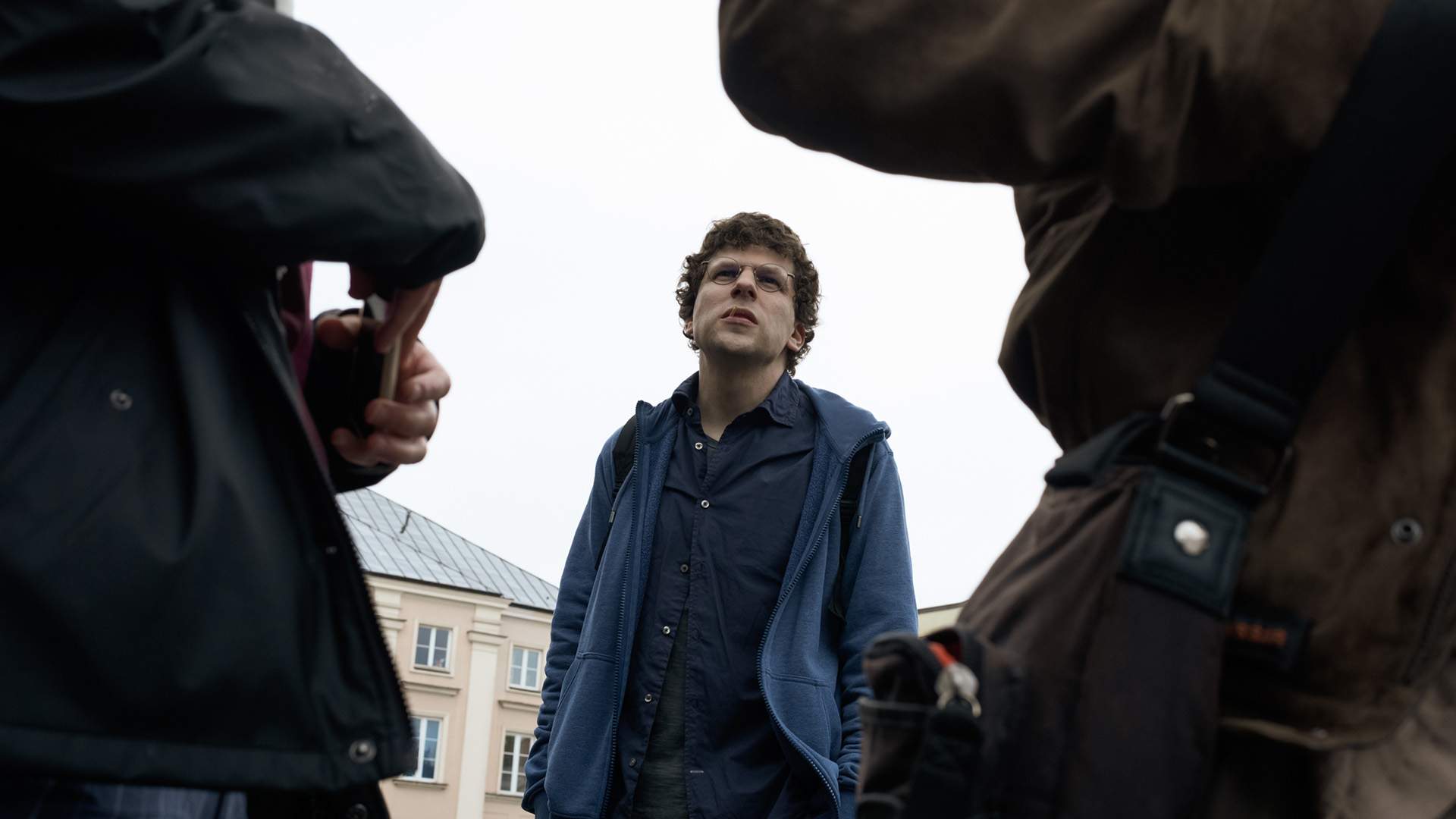
Photo by Agata Grzybowska. Courtesy of Searchlight Pictures © 2024 Searchlight Pictures All Rights Reserved.
So I just wrote it really quickly and all this great stuff came out about me hitting him in the airport, and then this just sad ending of me going home to my family and him stuck at the airport, and it just happened because everything had been set up. And it was in my mind, as you mentioned, throughout several other plays and short stories and stuff, and a real trip with my wife.
So once I was at that point, where the dominoes were all falling, I knew, 'oh, this is a story that feels complete'. And then I sent it to my parents and they had no idea what they were reading, because I sent it to them, I don't write in screenwriting programs, so I sent them an e-mail with no names above the characters. Anyway, they said 'this is terrible, what did you what did you do?'. And then I made it more official."

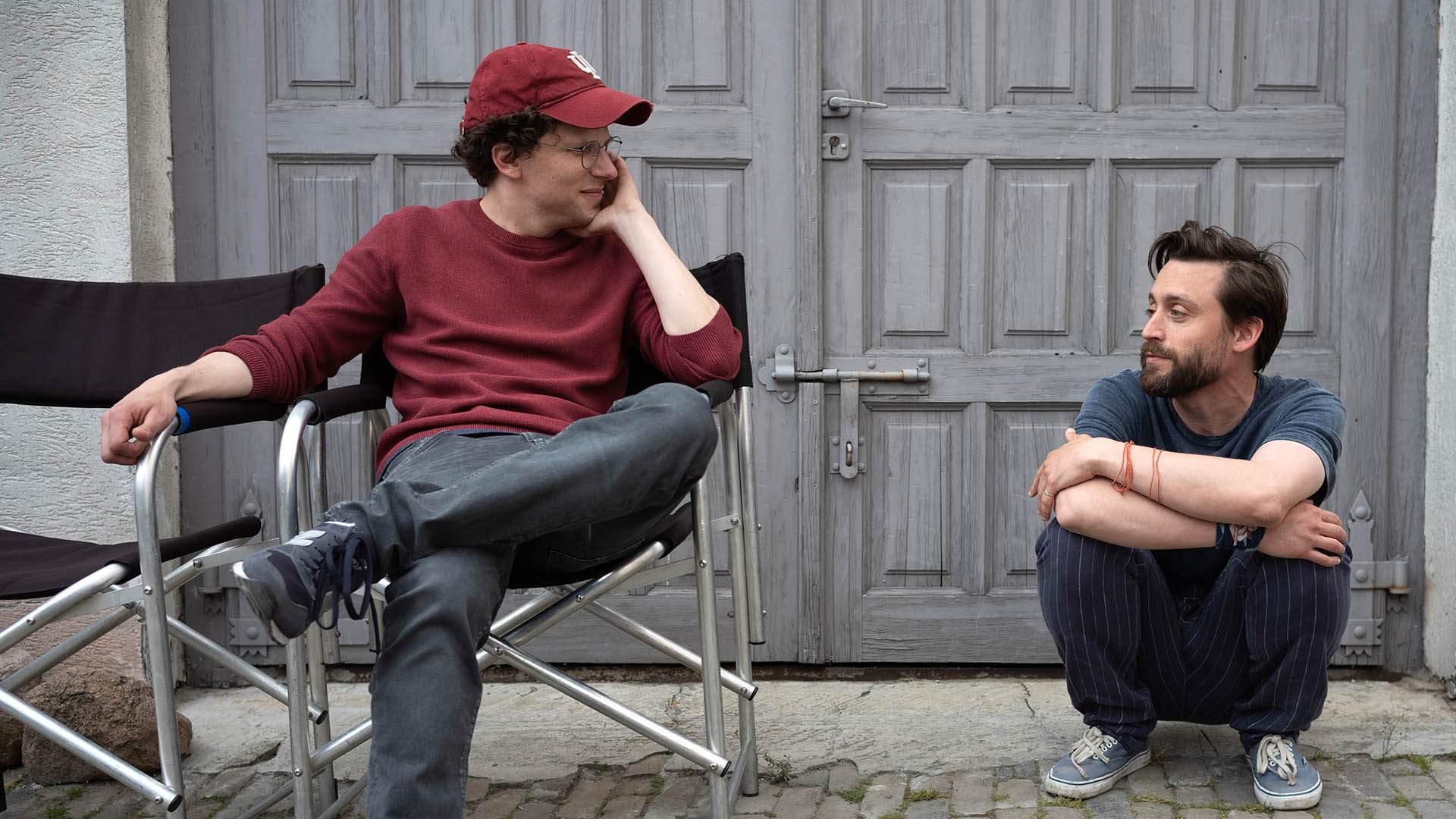
Photo by Agata Grzybowska, Courtesy of Searchlight Pictures, © 2024 Searchlight Pictures All Rights Reserved.
On What Eisenberg Was Excited About with Working with Kieran Culkin — and Casting Him in a Role That He Was First Planning to Play Himself
"I was originally thinking I would play the role of Benji. And our producer is Emma Stone, and she is obviously a very successful producer/actress, and she told me just it would not be a good idea to play a character like that, who's so kind of unhinged and spontaneous, while also trying to direct the movie where I had to be in my other side of my brain of managing a crew.
So once I decided I wasn't going to play that role and I was thinking about who could play it, the only person that seemed to me — it's strange, because he's not a Jewish actor — but the only person that seemed to me of my ilk is Kieran.

Tim P. Whitby/Getty Images for The Walt Disney Company Limited
I don't know what it is, that we're both from New York and speak in this kind of way, and have an energy about us that is similar, but I needed somebody similar and different to me. And Kieran is like me in so many ways and then completely the opposite of me in so many ways. He doesn't feel anxiety about acting. He doesn't think about it. He just wants to get to the set and to just perform. He doesn't want to talk. He does want to analyse it. He doesn't even sleep the night before, and he never wants to rehearse. And he's just comfortable in his own skin.
He's now winning, like today, he just won two major awards for the role. I think he doesn't even care. I sent him a congratulations message. He's never going to get back to me.
He just takes care of his kids and doesn't care about ambition, fame, success, any money, anything. He lives a really unusual life and it's exactly what I needed for the character. So what we were experiencing on set as colleagues was quite similar to what they're experiencing on set in character."


On Capturing the Relatable Dynamic of Loving Someone But Also Hating Them in a Powerful Monologue — and How Pivotal That Moment Was for Eisenberg
"Oh, very strangely pivotal in the sense that I was so conscious of the fact that I, as the writer/director, have a monologue in the movie. And I was so panicked about filming it, because I thought I would screw it up, and then I thought 'I don't want the other cast to be sitting there all day while I do this shot of myself'.
So the cinematographer and the producer Ali Herting [I Saw the TV Glow, The Curse] basically forced me into doing this long shot that pushes in. We did one take and I was too embarrassed to do it again, because it just seemed indulgent. It's the only take we got. And because I knew I only wanted to one take, I put all the eggs in the basket of it, and so it was very lived in, so to speak.
It's also the most-personal part of the movie — and this is a movie that is very personal. We film the movie at my family's house in Poland and it's about my family's history, and yet the most-personal part of the movie is where I say that stuff. Because I guess what I'm talking about is just the way I've felt in my relationships with other guys growing up, just finding people that I'm in awe of — not just guys, also women and family members and all sorts of people — where I have these dual feelings of wanting to be them and kill them at the same time, and loving them and hating them at the same time.
I'm living in the shadow of Benji, but in some ways my life has greater stability than his. In most ways, my life has more stability. And so I understand that I've created the life I want, and yet still every time I'm with him he brings up those childhood feelings of envy."


On What Eisenberg Makes of His Path From His Screen Debut in TV Series Get Real 25 Years Ago to Everything That's Come His Way Since, Including Writing and Directing
"When I was like 16, I got my first professional acting job, which was acting in this TV show. And I'll never forget the audition, all the executives were there, and I remember I was just trying to be funny in front of them. And I was not thinking of myself as a funny person at that point.
I was trying to be funny, and people were laughing, like adults were laughing. And I thought 'oh, that's interesting, I wonder if I'm allowed to just be funny the way I want to be funny — it can translate'. I didn't have to be funny like Adam Sandler or something. I could just be funny like myself.
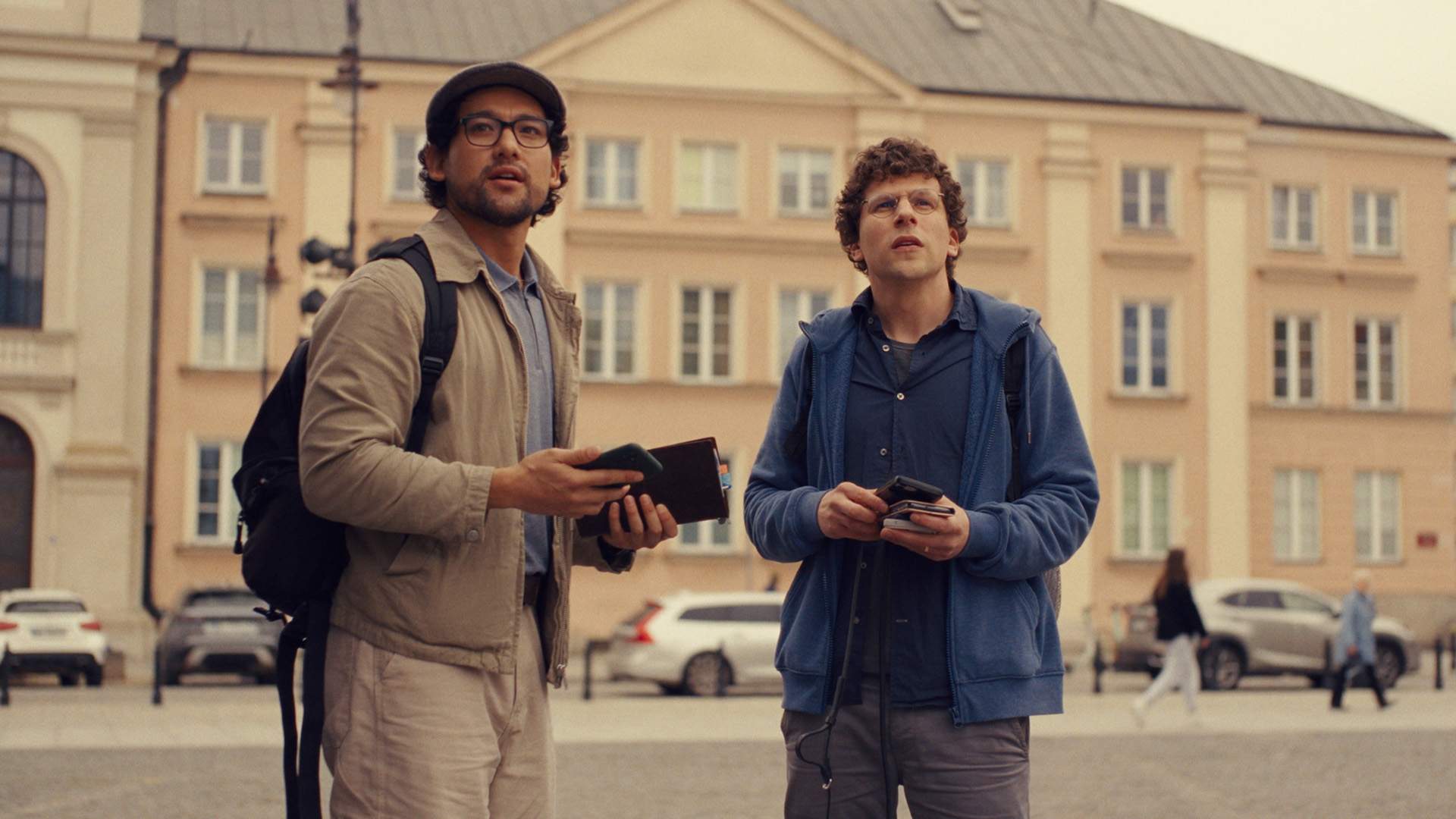
So that TV show allowed me to explore, let's say, my own voice as an actor. So that was a really, really lucky experience that no one watched. And since then, I've been very lucky to play roles where I can bring myself to it or bring my own sensibility to certain things, especially in a movie like A Real Pain, which is like my story, and I'm always surprised that anybody likes it. Because when you think of something that's your own, and that's private or artful or creative or something that's funny in your head, you never expect to have any kind of public reaction.
But now I've found myself in this very weird position where I get to write stuff and can produce it, and it just feels quite strange because it all still feels very personal."

A Real Pain opens in cinemas Down Under on Thursday, December 26, 2024.
Images: Courtesy of Searchlight Pictures. © 2024 Searchlight Pictures All Rights Reserved.
